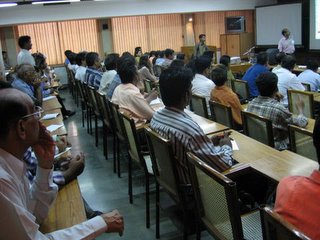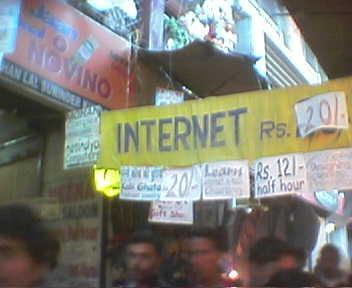Cyber Safety Week workshop for cyber Cafes concludes successfully


 The workshop for Cyber Cafe operators held under the aegis of
Mumbai Police & NASSCOM's “Cyber Safety Week” concluded successfully.
The venue at Mumbai suburb turned out to be very convenient. Over 100 Cyber Cafe operators from Mumbai suburbs & satellite
townships attended the event.
Rupa Naik of AIAI & Ashish saboo of ApiAp were the co-organizers on behalf of Mumbai Police & NASSCOM.
C-DAC - NCST 's Janabharatti team hosted the event by providing the venue & snacks. Thank you Mr George , Director Admin, C-DAC & Dr Alka Irani , Chief Investigator , Janabharatti for your support.
The Event begun with a welcome note by Ms Rupa Naik, executive director, AIAI,
To set the session rolling, it began by an introductory presentation of the Cyber Café industry in India by Ashish Saboo, President of ApiAp.
Mr Nanadakumar Sarawade, Director, Cyber Security & Surveillance, NASSCOM shared with the audience, on the possible cyber security threats in a Internet Café, He also helped clarified many issues on Cyber laws and the conduct of various regulatory agencies.
Mr. Rajiv Vaishnav - Regional Director (Western Region), NASSCOM, shared his perspective in Cyber Café’s role in bringing Internet awareness to the masses.
Ms Preeti Desai, President of Internet & Mobile Association of India offered a wonderful insight on Cyber café users E-commerce Activities. & How Cyber Cafes can be keen drivers in India's
e-volution. For the members mired with cutthroat competition, Ms Desai’s presentation offered an interesting food for thought.
Mr R.N.Bhaskar, Chairman E-convergence Technologies Limited further reinforced Ms Desai’s view by adding how every Cyber café can turn into a learning center.
Prof Jitendra Shah, Consultant, Department of Information Technology, Government of Maharashtra, shared his view on the potential role f Internet Cafes in E-governance, He offered a wonderful thought that, instead of “Internet Cafes being known as a place you spend money it should be looked as a place where you visit to earn money. Data processing is a significant task where Internet café ready made infrastructure can be of great help. Prof Shah & Mr Swapnil Hazare gave a brief demo of data processing in Indian regional language using Janabharatti , a free localized open source software.
Each of the speaker reinforced that there are a lot of opportunity for small cyber café operators, provided they make efforts to make their business place safe and welcoming to new
opportunities .
Officials from the Mumbai Cyber Cell, Inspector P C Chinchalkar, Shekhar Tore, Thane Police , shared their concerns on how Cyber Cafes were misused by some anti social elements and offered tips to safeguard their centers. The event also provided an opportunity to Cyber café operators to come out and express their problems they faced. Imposter understood well of the lack of clarity on Cyber Laws and general lack of awareness amongst the operators and took undue advantage of the situation and many fake raids were conducted. ApiAp had detailed the modus operandi but it is the first time many operators felt confident to come out and speak.
We hope this event and hopefully more such event will be organized in future will help build confidence and contribute the Intern kiosk operators cooperation in making Indian cyber
space safe.
The workshop for Cyber Cafe operators held under the aegis of
Mumbai Police & NASSCOM's “Cyber Safety Week” concluded successfully.
The venue at Mumbai suburb turned out to be very convenient. Over 100 Cyber Cafe operators from Mumbai suburbs & satellite
townships attended the event.
Rupa Naik of AIAI & Ashish saboo of ApiAp were the co-organizers on behalf of Mumbai Police & NASSCOM.
C-DAC - NCST 's Janabharatti team hosted the event by providing the venue & snacks. Thank you Mr George , Director Admin, C-DAC & Dr Alka Irani , Chief Investigator , Janabharatti for your support.
The Event begun with a welcome note by Ms Rupa Naik, executive director, AIAI,
To set the session rolling, it began by an introductory presentation of the Cyber Café industry in India by Ashish Saboo, President of ApiAp.
Mr Nanadakumar Sarawade, Director, Cyber Security & Surveillance, NASSCOM shared with the audience, on the possible cyber security threats in a Internet Café, He also helped clarified many issues on Cyber laws and the conduct of various regulatory agencies.
Mr. Rajiv Vaishnav - Regional Director (Western Region), NASSCOM, shared his perspective in Cyber Café’s role in bringing Internet awareness to the masses.
Ms Preeti Desai, President of Internet & Mobile Association of India offered a wonderful insight on Cyber café users E-commerce Activities. & How Cyber Cafes can be keen drivers in India's
e-volution. For the members mired with cutthroat competition, Ms Desai’s presentation offered an interesting food for thought.
Mr R.N.Bhaskar, Chairman E-convergence Technologies Limited further reinforced Ms Desai’s view by adding how every Cyber café can turn into a learning center.
Prof Jitendra Shah, Consultant, Department of Information Technology, Government of Maharashtra, shared his view on the potential role f Internet Cafes in E-governance, He offered a wonderful thought that, instead of “Internet Cafes being known as a place you spend money it should be looked as a place where you visit to earn money. Data processing is a significant task where Internet café ready made infrastructure can be of great help. Prof Shah & Mr Swapnil Hazare gave a brief demo of data processing in Indian regional language using Janabharatti , a free localized open source software.
Each of the speaker reinforced that there are a lot of opportunity for small cyber café operators, provided they make efforts to make their business place safe and welcoming to new
opportunities .
Officials from the Mumbai Cyber Cell, Inspector P C Chinchalkar, Shekhar Tore, Thane Police , shared their concerns on how Cyber Cafes were misused by some anti social elements and offered tips to safeguard their centers. The event also provided an opportunity to Cyber café operators to come out and express their problems they faced. Imposter understood well of the lack of clarity on Cyber Laws and general lack of awareness amongst the operators and took undue advantage of the situation and many fake raids were conducted. ApiAp had detailed the modus operandi but it is the first time many operators felt confident to come out and speak.
We hope this event and hopefully more such event will be organized in future will help build confidence and contribute the Intern kiosk operators cooperation in making Indian cyber
space safe.
